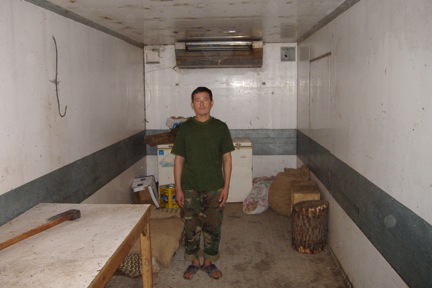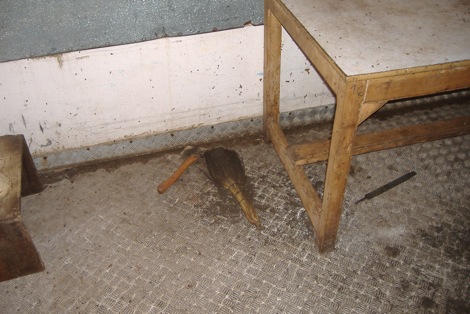A friend of mine, who has a background in food safety (and counter insurgency warfare) writes about his experience in Afganistan:
There I was, Oruzgon Province, Afghanistan, early 2008. My mission was training the Afghan National Army, but as a member of the Army National Guard, I bring other civilian skills to the table. Food science and ruminant nutrition can be useful in a war.
There had been a recent outbreak of foodborne illness in the Afghan National Army Brigade based in Tarin Kowt- I never got the number of sick soldiers, but it was enough to disrupt operations (they were too busy with vomiting and diarrhea to worry about anything else) Since I have a background in food safety and I had some free time, I got the chance to check into the food safety practices of the mess section and it was… interesting.

My interpreter and I started to check things out. The butcher (right, exactly as shown) had an adz, cutting table (to the left) and a meat hook (fashioned from bent rebar). He had just finished some task that resulted in the large blood smear behind the meat hook. Below the meat hook- peeled potatoes soaking in water. Mmm.
To the right, his chopping block (AKA big piece of firewood). There was no water or soap within 100 meters or so of this very un-refrigerated trailer (note the flies)
The below picture demonstrates the sanitation equipment — the hatchet and a blood soaked wheat straw broom.

After spending some time watching and investigating, I suggested some changes to their process. They cooked the meat really, really well, using pressure cookers, so that wasn’t such a problem. I did suggest that they clean using soap but there was a problem with access because the supply section was hoarding it.
Cross contamination was probably the most problematic – with my suggestion the staff moved the vegetables away from the butcher – vegetable prep was moved outside, away from raw, potentially contaminated meats (and meat hooks).
Although the head cook blamed the diarrhea outbreak on irradiated milk from the Dutch Army, my ideas on food safety were pretty well received and I kind of became “mentor” of the kitchen.
I have no idea how effective my solutions were long term; I only got to work with these soldiers for 3 months before moving to a new team in another province. But, I didn’t hear of any more outbreaks in Tarin Kowt.
Chapman occasionally has lunch at Taco Bell with the writer.
